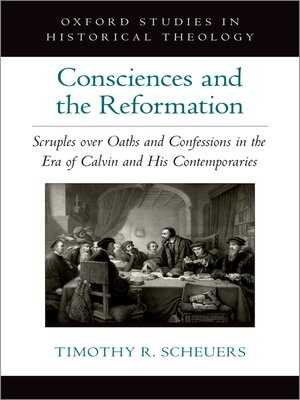Consciences and the Reformation
ebook ∣ Scruples over Oaths and Confessions in the Era of Calvin and His Contemporaries · Oxford Studies in Historical Theology
By Timothy R. Scheuers

Sign up to save your library
With an OverDrive account, you can save your favorite libraries for at-a-glance information about availability. Find out more about OverDrive accounts.
Find this title in Libby, the library reading app by OverDrive.



Search for a digital library with this title
Title found at these libraries:
| Loading... |
This book examines the contentious relationship between oath-taking, confessional subscription, and the binding of the conscience in reforms led by John Calvin. Calvin and his closest Reformed colleagues routinely distinguished what they believed were impious rules and constitutions in the Roman Church—human traditions claiming to bind the consciences of the faithful by putting them in fear of losing their salvation—and legitimate church observances, such as oaths and formal subscription to Reformed confessional standards. Doctrinal and moral reform in the cities became difficult, however, when friends and foes alike accused Calvin and his partners of burdening consciences with extra-Scriptural statements of faith composed by human authorities—a claim that, if true, would necessarily shape our assessment of the integrity of Calvin's Reformation. In light of these conflicts, author Timothy R. Scheuers offers a close reading of the texts and controversies surrounding Calvin's struggle for reform. In particular, he shows how they reveal the unique challenges Calvin and his colleagues encountered as they attempted to employ oath-swearing and formal confession of faith in order to consolidate the reformation of church and society. This book demonstrates how oaths and vows were used to shape confessional identity, secure social order, forge community, and promote faithfulness in public and private contracts. It also illustrates the complex and difficult task of protecting the individual conscience as Calvin sought to bring his new take on Christian freedom into Reformed communities.






